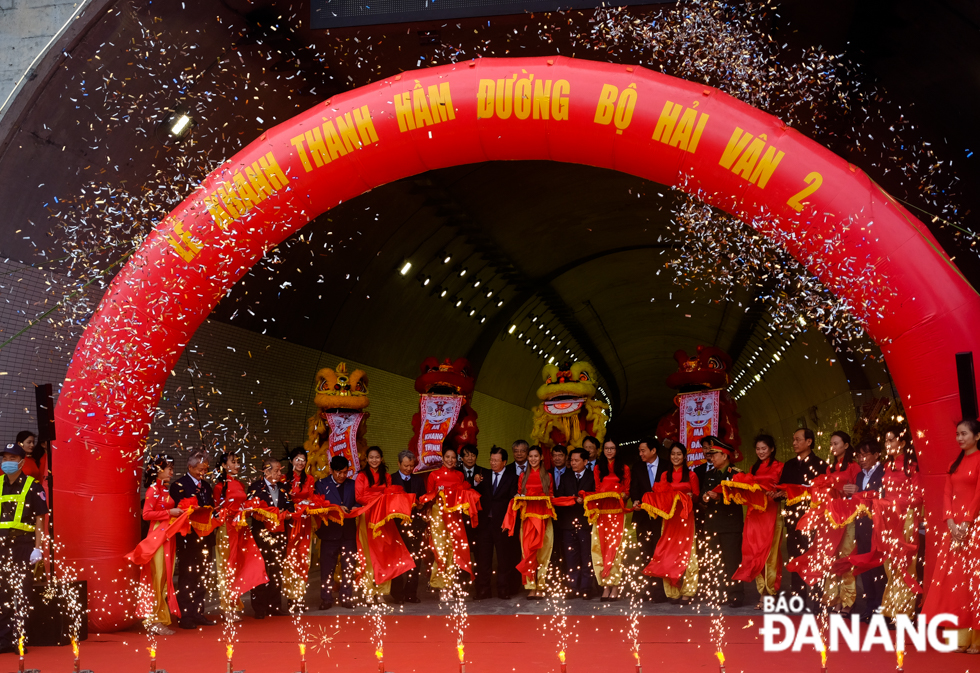
| Deputy Prime Minister Trinh Dinh Dung, the leaders of the Ministry of Transport and leaders from governments of Da Nang and Thua Thien-Hue attending the ribbon cutting ceremony for the inauguration of the Hai Van Tunnel 2 on Monday morning |
The new tunnel, which is the longest road tunnel in Southeast Asia, has been developed via the application of the New Austrian Tunnelling Method (NATM), also known as the sequential excavation method, a popular method of modern tunnel design and construction. This modern tunnelling technique has been successfully applied in many developed countries around the world because it has more advantages than conventional methods.
There is no denying that the construction of the new tunnel is considered one of Viet Nam’s technological breakthroughs, and demonstrates its enhanced tunnelling techniques.
Also present at the Monday inauguration ceremony taking place in the southern entrance to the new tunnel in Lien Chieu District, Da Nang, were Minister of Transport Nguyen Van The, the leaders of Viet Nam's national government ministries and agencies, Da Nang Party Committee Deputy Secretary cum People's Committee Chairman Le Trung Chinh and Thua Thien- Hue Party Committee Secretary Le Truong Luu.
Deputy Prime Minister Trinh Dinh Dung highly praised the Ho Chi Minh City-headquartered Deo Ca Investment JSC, the project’s developer, governments of Da Nang and Thua Thien- Hue, and contractors for their great joint efforts in successfully completed the construction work to put the tunnel into operation ahead the upcoming Lunar New Year 2021, hereby contributing to ensuring the safety of the traffic network in Central Viet Nam, and Viet Nam at large.
The new development is highly expected to enhance transport capacity, reduce travel expenses, shorten travel time for vehicles on the North-South road, promote regional economic development and enhance national competitiveness, ensure national defence and security in the coming time.
Moreover, the operation of the Hai Van Tunnel 2 will ensure a more synchronous transport connection with Central Highlands or the East-West Economic Corridor.
Da Nang Party Committee Deputy Secretary cum People's Committee Chairman Le Trung Chinh highlighted the development of the Hai Van Tunnel 2 for considerably ease the prolonged overload sparked by the growing number of vehicles running through the Hai Van Tunnel 1 over the past years, hereby meeting the current and future transportation needs.
The 1st stage of the project focused on upgrading the existing main Hai Van Tunnel and a section of the National Highway 1A. The construction work began in April 2016 and finished in August 2017.
The 2nd stage of the project involved the expansion of the over 6.2 km-long, two-lane emergency tunnel, which lies parallel to the Hai Van Tunnel 1, into a two-lane tunnel; as well as building a new 1.7 km-long stretch of road to Thua Thien-Hue Province’s Lang Co Town, and a four km-long roadway leading to Da Nang.
During the implementation of the first tunnel under the Hai Van Pass many years ago, work items such as design, construction and supervision were implemented by Japanese enterprises, whilst Vietnamese ones participated in this project as subcontractors. However, for the development of the second tunnel, Vietnamese people have mastered tunnelling techniques, and only a handful of Japanese experts gave support in terms of design and supervision consultancy.
During the construction, the project’s developer has been working closely with the Hai Van Tunnel Management and Operation JSC (Hamadeco), and the relevant agencies of Thua Thien-Hue Province and Da Nang, in a bid to effectively deploy the project whilst still ensuring the normal operation of the existing tunnel.
From 1 February to 21 February, 2021, the two tunnels will officially open to traffic. However, afterwards, the Hai Van Tunnel 2 will stop operating whilst Hai Van 1 will still operate as normal to meet the high public travel demand at the upcoming Tet festival, until further notice from Viet Nam's national government.
(Source: https://baodanang.vn/english)




